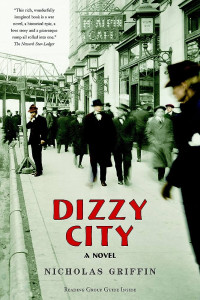 This book arrived in the Green Man mailroom some time ago as an uncorrected proof. The brownies put it into my review pile I think because I’ve reviewed other books about people who arrive in New York City and find less than reputable employment, such as Elizabeth Gaffney’s Metropolis. There are definitely similarities between that book and Dizzy City . . . but there are a few differences, too.
This book arrived in the Green Man mailroom some time ago as an uncorrected proof. The brownies put it into my review pile I think because I’ve reviewed other books about people who arrive in New York City and find less than reputable employment, such as Elizabeth Gaffney’s Metropolis. There are definitely similarities between that book and Dizzy City . . . but there are a few differences, too.
One of the most noteworthy differences is the time period. Metropolis took place in the 1870s and reflects the early years of the Gilded Age and the corruption of Tammany Hall. Dizzy City takes place in 1915-1916, as the Gilded Age is about to collapse of its own weight. This time period is fundamentally important to the plot. While the protagonist of Metropolis left his homeland to escape some dark circumstances, they related to his personal situation. Ben Cramb, the main character of Dizzy City, fled the blood-soaked battlefields of France after he watched his three best childhood friends die in the same pointless skirmish. He thus become a deserter.
Another difference is the character (as in the moral code) of the main character. The protagonist of Metropolis is, as I noted in my earlier review, “a decent bloke who happens to be in the wrong place at the wrong time.” Ben, however, is likeable enough, but he’s definitely an old-style London working class con man and thief, and proud of it. A few decades earlier, he would have been completely at home as a rapscallion in a Dickens novel.
But the most striking difference is the narrative style. Although Griffin sticks with third person throughout the novel, he periodically switches viewpoints, which enables the reader to learn about the backgrounds and motivations of some of the other characters long before Ben does. Because the entire novel is about a series of cons, this approach offers the reader an occasional rush of surprise that makes for an entertaining read.
I don’t want to reveal any of those surprises before you’ve had the pleasure of experiencing them for yourself, but I do want to give you a rough idea of the plot. Although Ben is wounded in the attack that kills his buddies, as soon as he is well enough to move on his own, he walks out of the medical facility and makes his way to London, where he stows away in the coal hold of a steamer bound who knows where.
While he’s surprised and relieved to find himself in New York City, he’s paranoid about being found out as a deserter (the penalty is hanging), and his East End accent is a dead giveaway. After sleeping on park benches and in flop houses a few nights, he uses his vaudeville background to score a gig as a piano player in a Bowery theater. A local con man, Julius McAteer, takes advantage of Ben’s fear of discovery and love of the con to ensnare him in an elaborate plot to bilk a Midwestern cattle dealer, Henry Jergens, of a large sum of money. Only Ben’s occasional battlefield flashbacks make him less than a perfect man for the job. Sometimes he just stops whatever he’s doing and stares into space.
The first part of the novel is told from Ben’s point of view. The second picks up with the supposed mark, Henry Jergens. The third takes the viewpoint of Katherine Howells, an actress Ben meets while at the theatre one night with Jergens. A relatively brief final section returns to Ben. By this time, about six months after Ben initially arrived in New York, both his paranoia and his battlefield flashbacks have reached a fever pitch. The novel reaches its climax with a real historical event, the explosion of a ship full of munitions anchored at Black Tom Island in New York Harbor.
As I was reading this book, I realized how much it reminded me of Theodore Dreiser’s rather bleak urban fiction, particularly The Titan, and of F. Scott Fitzgerald’s The Great Gatsby, which is certainly about a very skilled con artist. Griffin does a good job of capturing the grittiness of New York City and of revealing the motivations and tricks of people who live by their wits. I learned more about cons from reading this book than I ever wanted to know.
What bothered me about this book? Not a whole lot, overall. I found it a little surprising, given Ben’s rough and tumble childhood, that he could read and write, let alone play the piano. And I thought the ending was just a little too ambiguous. Other than that, I thought it was a fine read.
(Steerforth Press, 2007)
